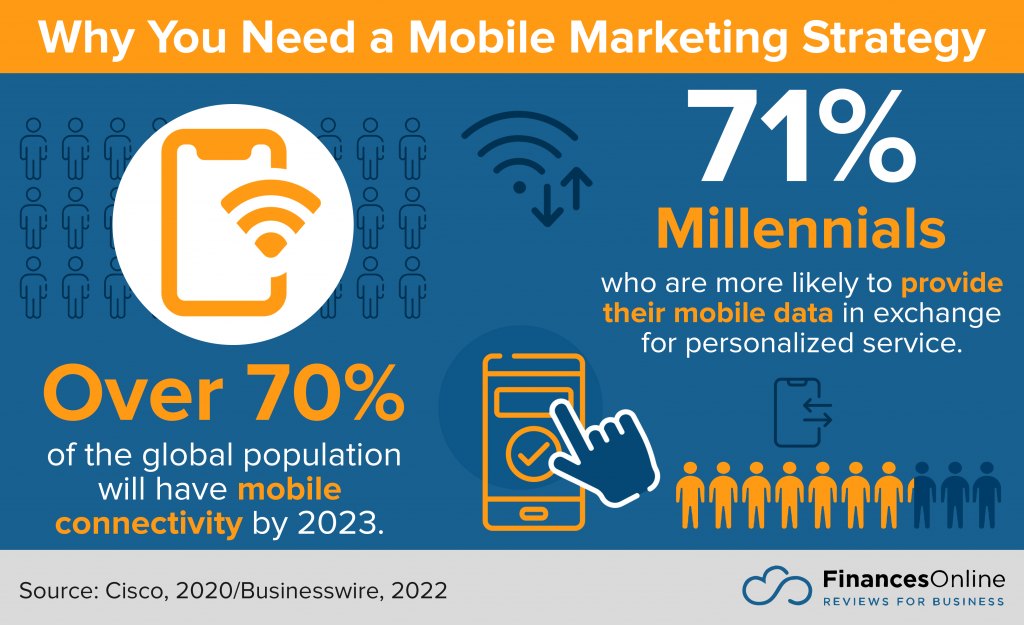We use mobile phones in nearly every aspect of our lives. Acting as mini-computers, these devices grant us access to a plethora of websites and apps that touch on various human activities. With this, more people browse the internet using their nifty little companions than desktops. And so, this opened up a huge avenue for brands to connect with their target audiences. Mobile marketing and the use of mobile marketing software have become essential components of any modern marketing strategy.
This guide will tackle the question, what is mobile marketing software? It will include a discussion of its features, types, and general benefits. The latest trends, price ranges, and potential issues surrounding the platform will also be touched on. By reading this article, brands will learn why including mobile marketing in their strategies is a good idea. After all, many businesses rely on it to increase brand awareness, inspire customer loyalty, and ultimately, raise profits.

What Is Mobile Marketing Table of Contents
What is mobile marketing software?
Mobile marketing software is a class of digital solutions that enables marketers to promote brands, products, and events by producing and distributing content across various mobile channels. These include SMS, email, social media, and brand landing pages. Since it’s intrinsically a marketing platform, the software carries tools for segmenting markets, streamlining the content distribution process, and generating insights on lead data and campaign performance.
Brands of all scales, coming from most industries, leverage mobile marketing platforms, given that a staggering 96.2% of internet users, aged 16 to 64, own a mobile device. Moreover, users spend an average of 4 hours and 48 minutes on their mobile devices each day, which partially encapsulates the 2 hours and 27 minutes spent on social media daily. Gaining just a tiny fraction of the world’s mobile users and their attention spans leads to significant profits for any company.
As such, mobile marketing systems enable brands to create campaigns, content, and messages deployed to multiple channels of interest. Tools for mass sending emails and SMS messages enable brands to reach as many people as possible within short periods. Meanwhile, the platforms’ two-way communications solutions allow brands and customers to interact in real-time so that queries and concerns can be quickly resolved. Moreover, some systems come with automated custom workflows that can be used to map out customer journeys and the content distribution process, among many others.
The flexibility of mobile marketing platforms makes them highly scalable and adaptable to any type of operation.
Source: DataReportal 2022
What is Mobile Marketing Automation?
To know what is mobile marketing automation, you should look no further than the toolsets of advanced omnichannel platforms. They come with customizable forms and flowcharts used to simulate and improve the workflows that comprise operations. Upon building workflows and their stages, these simulations automatically perform certain tasks and alert users to work on those that require human intervention.
This brings a host of advantages to brands according to recent marketing automation statistics. For starters, 84% of marketers experienced success in leveraging automation in their campaigns. After all, it promotes operational efficiency, which leads to increased productivity, decreased overhead, and higher sales.
Types of Mobile Marketing Software
If one ponders the mobile marketing definition, it is pretty much digital marketing on mobile, which is as broad as they come when it comes to coverage. There are platforms that provide holistic solutions while others specialize in one or a combination of areas like SMS, social media, and in-app ads. To give you a clearer view, here are the different types of mobile marketing software:
- Multichannel Solutions. Comprehensive mobile marketing platforms centralize all mobile marketing work and streamline the workflows involved. Advanced systems come as marketing automation platforms and automatically perform tasks in each workflow stage.
- SMS and Email Solutions. These platforms impart convenience in sending SMS and email to leads and customers. Their key features include mass sending, group sending, two-way SMS messaging, and message analytics.
- Ads Solutions. These solutions help brands optimize their mobile advertising campaigns. Data surrounding keywords, search impressions, app opens, purchases, and revenues are gathered and then turned into detailed reports with actionable insights. Some programs even automate CPT bids.
- Push Solutions. These programs enable marketers to configure push notifications so that the ones sent to clients bear product information, promos, event invites, and other relevant info. They are also often equipped with auto-responders and tools for market segmentation.
Features of Mobile Marketing Software
Mobile marketing platforms often come with a slew of functionalities for market analysis, communications, and multichannel content distribution. The aim of using one is to identify a brand’s target markets and furnish content that draws engagement, raises brand awareness, and increases conversions, as evidenced by its key features.
Mass SMS and Email Sending
Mass sending of email and SMS is critical to any mobile marketing campaign since it allows brands to send promos, event invites, or product information to a large number of people in one go. In fact, some platforms accommodate thousands of messages to ensure that there will be at least a handful of buyers or event attendees. It’s important to note that SMS is still effective in marketing even though most people have turned to instant messaging for quick conversations, and recent SMS marketing statistics back this up. SMS messages carry a 98% open rate and a 29% conversion rate.
How Effective are SMS Messages as Marketing Tools?
Open Rate: 98
Open Rate
%Clickthrough Rate: 45
Clickthrough Rate
%Response Rate : 30
Response Rate
%Conversion Rate : 29
Conversion Rate
%Source: SMSGlobal 2021, SimpleTexting 2022
Designed byTwo-Way Messaging
Mobile marketing systems afford brands and their customers messaging tools that allow them to interact with one another. Most platforms open up SMS channels for this, alongside readily available media like email and social media. As a result, any customer concern can be swiftly addressed by brands. In addition, brands get to develop meaningful relationships with their customers by entertaining feedback or inviting them to special events. This shapes a positive customer experience, which can lead to brand loyalty, purchases, and glowing reviews.
Proximity Marketing
Tapping into the geolocation capabilities of smartphones, mobile marketing platforms enable brands to furnish location-specific promos and advertising to customers. When shoppers enter a set location, promos and discount codes will be sent to their mobile devices. This drives people to visit physical stores and can also be used to entice shoppers who are near the area of competitor shops. For this to work, the offers should promote exclusivity and carry juicy deals that shoppers can’t ignore.
Promos and Coupons
Mobile marketing systems enable users to create different types of promos and coupons, which include coupons with discount codes, QR code promos, and text-to-win promotions. In addition, brands can set push notifications to alert customers about the latest promos or confirm that they have received their invites or coupons. Since these features trigger and add convenience to digital transactions, many brands and online sellers leverage them for their marketing campaigns.
In-App Advertising
Mobile marketing platforms carry solutions with which marketers can create in-app and in-game ads. This takes advantage of the fact that most mobile users spend hours fiddling with their favorite apps and mobile games. As such, app developers and retail brands use the software to promote their wares on mobile applications and other media.
Automated Workflows
Marketing campaigns entail a lot of work, so much so that some of the tasks are either forgotten or not focused on enough. Mobile marketing systems keep this from happening by enabling users to organize their tasks into workflows. Each stage is populated with tasks arranged in sequential order, incorporating marketing channels on which outputs will be routed like email, SMS, and social media. Advanced platforms are capable of automatically performing tasks and alerting users to the next tasks to perform.
Moreover, the workflows can also be leveraged to map out and optimize customer journeys. This vastly improves customer experiences and enforces operational efficiency within the organization.
Smart Analytics
Mobile marketing systems quantify the actions they performed and the key performance indicators of marketing campaigns by producing detailed reports and actionable insights. Marketers also use these platforms to perform A/B testing to categorize leads and customers into segments. With this, they can ensure that their campaigns are perpetually targeting audiences who would likely engage and convert the most.
In addition, the analytics engines of these platforms document the data of previous campaigns. This allows marketers to review past strategies and improve current ones. Furthermore, mobile marketing platforms can be leveraged to monitor competitors and assess their plans.
Benefits of Mobile Marketing Software
According to a 2021 report, 69% of marketers include mobile channels in their digital strategies, and more popular channels like social media (91%) and digital ads (91%) also touch on mobile marketing. The reason for this lies in the countless benefits that give mobile marketing meaning to most brands. The advantages brought by mobile marketing solutions range from enhancing productivity to boosting customer engagement.
Discerning the Target Market
The analytics engines of mobile marketing systems can pick up the demographic data of customers and group them into segments. Likewise, some platforms carry the capacity to conduct A/B testing to segregate groups. These features allow you to identify segments that buy from and engage with your brand the most. As such, your campaigns will target audiences who will most likely convert. Moreover, if you’re using a platform in conjunction with a social media monitoring system, you will know how to properly communicate with your target markets.
Increased Reach
With features like mass SMS and email sending, brands get to touch base with hundreds, or even thousands, of people in one go. This vastly speeds up the sending process, allowing you to even target segments adjacent to your targets. More importantly, your latest products and promos will likely generate a buzz, given the expanded reach afforded to you by the platform. Likewise, your events would likely draw crowds.
If we look at the numbers, emails carry an average open rate of 29.55% and an average click rate of 1.27%. Combine these with SMS’ staggering open rate of 98% and response rate of 48% and you have a strong chance of converting should you reach out to a sizable target. Some platforms also have solutions for social media, which, when leveraged, improve brand awareness and conversions further.
Boost in Traffic
A mobile marketing system, especially a multichannel solution, has many ways to boost website, social media, and app traffic. After all, it streamlines the process of distributing content and promotions to various mobile channels, and some platforms even afford landing pages to which audiences are linked. Even if leads are offline, they can still receive promo SMS messages. Meanwhile, those on the go may receive promo notifications or become the subjects of QR code promos and hyperlocal marketing campaigns. In a nutshell, it has the capacity to make your promotions ubiquitous to drive traffic.
Raised Engagement
A mobile marketing platform is a marketer’s artillery room to increase engagement. Depending on what is mobile marketing to their campaign, they can opt to send content and promos to targeted audiences on social media, SMS, blogs, and email. Better yet, you can apply a distinct content strategy for each segment, accounting for their interests, and have the platform distribute the content to each group. This potentially raises the engagement of your posts and promos.
Furthermore, mobile marketing systems and social media platforms enable brands to monitor the engagement of each post and see which types of content draw the most likes, shares, and comments. With this, you can fine-tune your social media strategy in accordance with your audience’s suggested preferences.
Drive Store Sales
By harnessing the GPS of smartphones, a mobile marketing system bears the ability to create geofenced promos that cater to the location-specific interests of people. In simpler terms, the platform allows you to send notifications that carry promos or discount codes to leads when they enter a specific location, say, the areas surrounding your physical stores. Should the promos be exclusive to particular locations and have enticing terms, these would likely cause an uptick in traffic to your stores.
Reduced Turnaround Times
Multichannel mobile marketing solutions enable you to optimize your brand’s workflows. This means you can automate routine tasks, eliminate redundant ones, and merge smaller jobs with bigger ones. As such, a mobile marketing platform reduces process times across the board. Moreover, features like text blasts and mass email sending vastly reduce the time spent reaching out to leads and customers. Likewise, the ads solutions carried by software quickly generate insights and automate bids.
Interestingly, these platforms also allow you to streamline the buying process of customers. You can create customer journeys with shortened steps and a link to a payment gateway. This fast-tracks transactions and potentially increases conversions.
Build Meaningful Relationships
Mobile marketing systems grant you access to communication tools with which you can interact with leads and customers. Two-way SMS messaging allows you to communicate promos, events, and new products to your customers. You can even leverage it for customer support should there be an internet outage. Moreover, other avenues like email and social media can be used to quickly respond to customer queries and concerns. Even QR codes can be leveraged for newsletters, which is another form of communication.
By attentively communicating with your customer base, you can strengthen your relationships. As a result, your leads and customers will build trust and feel good about buying from your brand.
Retargeted Leads
Proximity or hyperlocal marketing is not just for driving store traffic, it can also deny customers from your competitors. Set the geofenced promos near the physical stores of the competition and you have a chance of drawing them to your shops, provided that your deals are better than what your competitors offer. Besides this, a mobile marketing platform can send special offers to customers who are about to leave the vicinity.

Examples of Mobile Marketing Software
Finding a mobile marketing solution can pose a challenge given the number of worthwhile products on the market. To eliminate any confusion, we have compiled the five leading applications available.
Maropost Marketing Cloud
An all-in-one marketing solution, Maropost Marketing Cloud enables businesses of all sizes to streamline their entire digital marketing process. Users can build optimized workflows and automate tasks. Calculations and other simple tasks are performed by the system while more complex ones are automatically routed to designated task owners. The system also carries tools for social media lead generation, audience segmentation, and retargeting campaigns. Moreover, Marpost offers customizable landing pages on which customers can make purchases.
Trumpia
Built for businesses of all scales, Trumpia is a multifunctional mobile marketing software that presents comprehensive solutions for text messaging and improving customer engagement. It comes with mass SMS sending and SMS automation that lets marketers reach out to a large number of leads in one go. To help businesses build meaningful relationships with leads and customers, the system carries features like omnichannel messaging and two-way messaging. It also has a smart targeting feature that helps target the right segments.
Messente
Messente is a powerful mobile marketing system that allows brands to send SMS messages to more than 190 countries. To ensure that the messages will be received by leads and customers, the platform partnered with more than 800 mobile networks. This is in conjunction with its adapting routing capability, which guarantees that messages are coursed through the fastest available routes. Messente also provides omnichannel messaging so brands can freely interact with leads and customers, and vice versa.
SearchAdsHQ
An official Apple Search Ads partner, SearchAdsHQ is an integrated mobile marketing system that helps brands streamline Apple Search Ads campaigns. It provides full visibility of the media buying funnel and real-time intelligence, which includes taps, impressions, and spending, so users can make informed decisions. The platform is also equipped with a revenue and conversion tracking module that enables brands to optimize in-app activities for revenues. Moreover, SearchAdsHQ supports custom workflow automation.
Mobile Text Alerts
Mobile Text Alerts is a dynamic mobile marketing application that simplifies SMS campaigns with its expansive toolset. Guaranteeing a 99% read rate on text messages, the platform enhances mass SMS sending by pairing it with a scheduling system and offering different modes of subscription. As such, leads can subscribe to a brand’s promos by sending a keyword or a shortcode. It also provides useful tools like message templates, picture messaging, SMS analytics, and two-way SMS messaging. Moreover, Mobile Text Alerts furnish custom sign-up pages for leads.

Marpost Marketing Cloud lets you map out customer journeys
Cost of Mobile Marketing Software
The rates and pricing schemes applied by mobile marketing software vendors vary. Some offer a slew of monthly packages while others are purely quote-based. To give you a clearer view, here are a few examples:
- Maropost Marketing Cloud – This platform offers three plans, beginning with its Essentials plan, which starts at $500/month. The two higher-tier plans, Professional and Enterprise, are available by quote.
- Trumpia – This software offers a series of plans under two main packages. The starting rates of its Core Plans range from $45/month ($36/month for annual billings) to $625/month ($500/month for annual billings). Meanwhile, the starting rates of its Advanced Plans range from $195/month ($156/month f0r annual billings) to $3,995/month ($3,196/month f0r annual billings).
- Messente – Offering no price packages, this platform’s pricing is on a per-message, per-country basis. The baseline rate is €0.016 per message. With this, sending 100 messages nets a charge of €1.62.
- SearchAdsHQ – This software has a single quote-based plan.
- PushEngage – This platform offers five plans, one of which is a generous free plan. The starting rates of the next four packages range from $29/month to $99/month while its most prestigious plan is by quote. It also has a free trial.
Mobile Marketing Software Buying Factors
Rather than solely looking at the price, it’s better for brands to focus on the capabilities of mobile marketing platforms and make a selection based on their needs and allotted budgets. After all, they will end up spending on the areas not covered by solutions that don’t fully integrate with their operations. It’s a matter of answering what is mobile marketing and how does it work for your brand when choosing software.
To make your life easier, let’s take a look at several factors to consider.
Mass Messaging Solution
Reaching the most number of people with little effort is an essential feature regardless of how a brand intends to leverage a mobile marketing platform since it expands brand awareness, stimulates consumer engagement, and raises conversions. As such, features like mass SMS and email sending prove to be beneficial to any operation. These enable users to send hundreds, even thousands, of messages to targeted segments. Given the high open and response rates of SMS and email, brand campaigns can gain traction if mass messaging solutions are fully leveraged.
Communication Tools
It’s one thing to send promos to people, it’s certainly another to afford them the means to reply or directly communicate with brands. Doing so builds trust and influences positive brand experiences. Fortunately, top-tier mobile marketing solutions are often equipped with two-way SMS messaging and omnichannel communications with which productive relationships with customers can be forged.
Core Features
Mobile marketing meaning tends to vary based on a brand’s needs and operations, which is why mobile marketing platforms are available in different forms. Some offer multichannel solutions that streamline your entire mobile marketing operation. Others specialize in certain aspects of mobile marketing, say, SMS or search ads solutions, and furnish comprehensive features in that sphere. And there are those that treat mobile marketing as a module of a larger system like a digital marketing system, a collaboration platform, or a marketing automation solution.
As such, when buying software, you have to match your exact needs with the platform’s core features before making a decision. An ideal fit leads to vastly improved operational efficiency and better conversions.
Cost Efficiency
Even though core features are a bigger priority, cost remains a major factor when looking for a mobile marketing platform. At the end of the day, you’re working with a set budget for technology. The goal is for your pick to not exceed your budget, otherwise, the purchase could be questioned by top management. With this, you can look at several options with similar features and make your pick based on which has the most reasonable plan.
Ease of Use
A mobile marketing solution may carry all the instrumental features, but if using any of them feels like learning calculus for the first time, you might be better off with a different platform. It takes time to learn the ropes of a complex interface, and taking too much time can cost your brand money and opportunities. Thankfully, many of the leading mobile marketing platforms have straightforward interfaces and functionalities. Besides, you can always try out the free trials and plans offered by vendors to see how the platforms work.
Automation
In mobile marketing, automation is often involved in one form or another. Some heavily leverage the feature to empower custom workflows that make up entire marketing operations. Others solely automate specific functions like SMS and email sending, scheduling, and distribution. The reason for automation’s prevalence is that it speeds up tasks while minimizing work. It’s one of the main reasons why mobile marketing platforms vastly improve operational efficiency.
Exceptional Support
Responsive support helps a lot when you encounter any software-related concern, from installation issues to possible bugs. It also aids users should they encounter difficulty in using any of the features. This is why many reputable software companies offer support in various channels, including live chat, email, tickets, and phone service. Most vendors also maintain a comprehensive knowledge base that allows you to self-troubleshoot common non-complex concerns.
Mobile Marketing Software Trends
As technology continues to advance, aspects surrounding mobile marketing have followed suit. The latest mobile marketing software trends convey the continued acceleration of mCommerce, the current relevance of video content, and the growth of voice searches.
Maintained Dominance of Mcommerce
The COVID-19 pandemic has made people spend more time on their mobile devices for business and pleasure. And the biggest pleasure for many happens to be retail therapy. According to recent mcommerce statistics, the mobile phone has become the most preferred shopping tool in the United States. In fact, 71% of retail website visits and 58% of orders come from mobile devices, higher on both counts than desktops (27% of visits, 39% of orders) and tablets (2% of visits and orders).
The mobile marketing market is expected to grow from $66.42 billion in 2020 to a staggering $253.40 billion by 2026, with annual growth of 25%. This means the use of mobile phones for shopping remains a norm.
Continued Popularity of Mobile Video Content
Video remains a favored medium for consumers and marketers. Recent mobile marketing statistics show an uptick in mobile video consumption and ad spending. In regard to mobile consumers, 52.5% have been consuming more video content since the start of the pandemic. On the marketers’ side, the value of mobile video ad spending in the United States is projected to increase from $22.9 billion in 2020 to $53.9 billion by 2025.
The Rise of Voice Searches
Heavy mobile use leads to the increased usage of voice searches. After all, it’s faster to bark out orders to a mobile phone than to type them on a search engine. Of course, the more voice searches are used, the higher their relevance in the digital marketing sphere. And the latest voice search statistics affirm this to be the case recently. A projected 40.2% of the US population is expected to use voice assistants monthly by 2022. This is higher than the 34.19% penetration in 2019.
Source: eMarketer 2020
Potential Issues with Mobile Marketing Software
While mobile marketing platforms present a host of clear advantages, they also hold their share of likely problem areas. The following concerns may be encountered when using one in a sophisticated campaign:
Lack of Mobile Standardization
Rolling out a singular campaign across all devices might be ideal, but the differences in mobile specifications make the task challenging. Mobile devices vary in screen sizes, operating systems, and browsers. And each of these factors potentially generates a distinct experience. Take the case of the tablet. Although considered a mobile device, the gadget owns a far larger screen than smartphones. The browsing experience differs as users tinker with it in the same manner as laptops instead of mobile phones. This might call for an adjustment in strategies.
Limited App Discovery Optimization
Advertising on apps poses a challenge to marketers for a couple of reasons: app discovery and limited app functionality. Unlike mobile websites, apps do not use cookies and bear a limited spectrum of functions, say, selling products or instant messaging. This restricts the manner in which ads are presented. As for app discovery, app stores do not abide by the same algorithms as search engines. In addition, the Apple App Store and Google Playstore carry their own set of app listing rules that have to be accounted for in marketing plans. This points to the need for more comprehensive search marketing tools and plans.
Segmenting Difficulties
Sometimes mobile marketing platforms miss the mark in segmenting markets, especially when the differences between groups go beyond basic demographic data. This highlights the need for A/B testing. The feature enables marketers to thoroughly sieve audiences based on their interests and behavior, leading to the proper identification of segments. With the right people targeted, a brand’s content marketing solutions will then effectively raise engagements and sales.
Should you buy a mobile marketing platform?
Mobile marketing platforms present a host of benefits that improve brand awareness, consumer engagement, and conversions across various mobile channels. In using one, a brand gains sight of its true audience, vastly increases its leads, and enjoys enhanced operational efficiency. You even get to build better relationships with your leads and customers, thanks to the communication tools of these solutions. They surely make worthwhile investments.
The challenge lies not in purchasing one, but in picking the right product for your operations. Before deciding on a platform, ask yourself the question, “What is mobile marketing according to your needs?” Do you need a holistic solution that streamlines other facets of digital marketing? If not, would you need a platform that boosts and automates your SMS and email sending workflows? By answering these questions, you can shortlist your options and pick one based on your budget or a platform’s perceived reliability.
Speaking of questions, do you know what multichannel marketing is and how it can help your brand grow? Check out our comprehensive guide on the subject.


























Leave a comment!